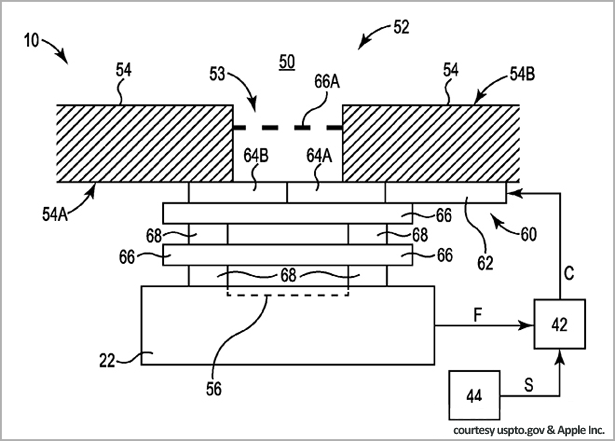Practically every electronic device is dropped at some point in its existence, since humans are natural “butterfingers,” and a new patent application by Apple Inc. (NASDAQ:AAPL) attempts to address that problem with devices that can sense when they are falling and close internal shutters and the like to protect sensitive internal components from the anticipated shock. The same patent indicates that delicate, miniaturized audio components can be damaged by external sound waves such as loud music or jet engines, and could be shielded using a similar automatic shuttering system.
The patent application, #20140150558, “Active Protection for Acoustic Device,” details how advanced audio components deliver superb sound while occupying little room thanks to miniaturization, but are also exceptionally vulnerable to damage. One source of this damage is user dropping their iPhone or other device. In order to detect this and engage active protective measures, the device would include an accelerometer and gyroscope, providing data feedback that a controller would then interpret to determine if use of protective responses was merited.

To counter the damaging effects of external sounds, including “air bursts,” the Apple (AAPL) device would sense pressure differentials inside the audio port and outside it. When incoming pressure mounted above outgoing pressure, the audio port would close, preventing extremely loud noises from damaging the sensitive electronic components within.
The patent application was filed with Apple Inc. (AAPL) as the assignee. The application was filed on November 16th, 2012, and the inventor of record is Kelvin Kwong of San Jose, California. Educated at the University of California, Berkeley, Mr. Kwong is a senior mechanical engineer at Apple, according to his LinkedIn profile. He is a senior member of the iPhone design team and worked at Xerox for close to eight years before shifting to Apple in late 2010. Mr. Kwong has filed 19 patent applications, of which 12 have been issued as actual patents.
This idea seems sound, considering that it would increase the lifespan and durability of devices equipped with it. Furthermore, it appears to lay the groundwork for additional “reflexive defenses” in the future. It is not too difficult to imagine a laptop computer that senses when it has been dropped and lifts the reader head away from the hard disk until after the impact occurs, thus preventing that type of damage at a minimum.
Active protection for electronic components would make computers, smartphones, and other consumer devices longer lasting in the rough and tumble of real life, and Apple’s (AAPL) patent filing pioneers the concept constructively.




